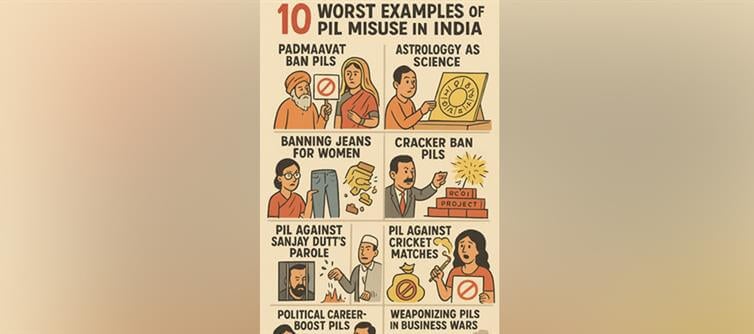
Public Interest Litigation (PIL) was meant to be a revolutionary tool — empowering citizens to demand justice. But over time, it has been hijacked by vested interests, frivolous activists, and political operators. Here are 10 real examples where PILs mocked the very purpose of justice:
1. The Padmaavat Ban PILs (2017–18)
Multiple PILs were filed across india to stop the release of Sanjay Leela Bhansali’s film Padmaavat on the grounds of “hurting sentiments.” Instead of protecting free speech, courts got dragged into cinematic politics, wasting precious judicial time on a bollywood release.
2. Astrology as Science (2004)
A PIL was filed demanding that astrology be declared a legitimate science and taught at universities. Instead of focusing on crumbling education infrastructure, the judiciary had to waste time debating superstition in the name of public interest.
3. Banning Jeans for women (2007)
One PIL suggested banning jeans and western clothing for women, citing “erosion of indian culture.” Courts had to entertain and dismiss such regressive nonsense instead of addressing real issues like crimes against women.
4. Cracker Ban PILs (2015 onwards)
While pollution is a genuine issue, repeated PILs sought only a diwali cracker ban, ignoring larger industrial and vehicular pollution that cause 80% of Delhi’s smog. The result? Symbolism over substance, leaving citizens with token bans instead of real solutions.
5. Political Vendetta PILs (Various Years)
Political parties often sponsor PILs through proxies to target rivals. For example, PILs have been used to stall infrastructure projects by alleging environmental violations, conveniently when projects belong to opposition governments.
6. PIL Against Sanjay Dutt’s Parole (2014)
A PIL was filed to cancel actor Sanjay Dutt’s parole, alleging political favoritism. Instead of being a criminal law matter, it was converted into a “public interest” case, turning the court into a stage for celebrity gossip rather than justice.
7. PIL Against cricket Matches (2016)
During Maharashtra’s drought, a PIL sought cancellation of IPL matches to “save water.” The courts were forced to step in and relocate matches, while ignoring the industrial and political misuse of water that dwarfed stadium needs. A classic case of selective outrage.
8. Political Career-Boost PILs (Common Trend)
Many lawyers and activists file headline-grabbing PILs just to make a name for themselves — from banning reality shows to regulating social media memes. They know such cases will get dismissed, but the publicity will stick.
9. Trivial lifestyle PILs (Ongoing)
Over the years, PILs have been filed against Valentine’s Day celebrations, beauty contests, “obscene” advertisements, and even against reality shows like Bigg Boss. These serve no one but those hungry for limelight.
10. Weaponizing PILs in business Wars
Several big corporates have used proxy petitioners to file PILs to stall rivals’ projects — whether power plants, mining contracts, or telecom spectrum allocations. These PILs aren’t about public interest — they’re about corporate sabotage through courts.
The Larger Problem
These examples show that PILs have drifted far away from their original intent of protecting marginalized citizens. Instead, they have become:
A political tool for parties.
A publicity stunt for activists.
A corporate weapon for businesses.
A distraction from real systemic issues.
Until the judiciary clamps down hard on frivolous and fake PILs, the system will keep bleeding time, money, and credibility.
⚡ From jeans to films to crackers, India’s courts are busy firefighting nonsense PILs — while real justice gasps for breath.




 click and follow Indiaherald WhatsApp channel
click and follow Indiaherald WhatsApp channel